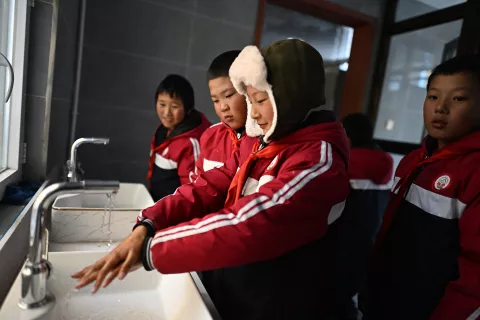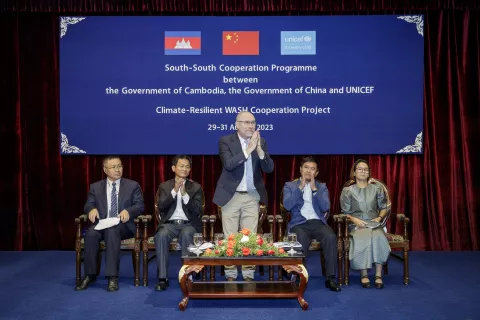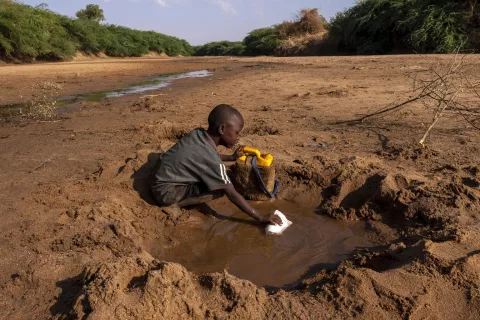Report from Quake Zone: Safe water, Safe Lives
Report from Quake Zone: Safe water, Safe Lives
Until very recently, 12-year-old Li Xiaoling drank the spring water that originated from the Longmen Shan, or the Dragon's Gate Mountains of the Tibetan Plateau.
Sitting in a makeshift house set up on the bank of the Yanhe River outside her home town Bailu Township of Pengzhou city, Sichuan Province, Li says, "It tastes a little sweet. We used it to cook and to bathe." The mountain water flows inducted through a bamboo pipe to a well on the backyard of her home.
Now the water is suspect. That sweet water source was damaged due to the recent earthquake that struck on May 12 at Wenchuan, in southwestern China's Sichuan Province. The Longmen Shan are the steepest and most rugged mountains in the world. With its epicenter along the Longmen Shan Fold and Thrust Belt, the earthquake destroyed Li Xiaoling's home, and her rural school. Fortunately, all of 1046 students survived the quake.
Li and most of her schoolmates are now living with their families in temporary housing with temporary water systems set up by the local government.
"The piped water is awful because it has strong bleach and disinfectant taste," Li Xiaoling says, with her nose pursed up. But her mother, Jiang Chengju aged 42, says that "water is never tasted so blessed."
"Experts told us clean-looking water, like the water from the Longmen Shan, might not be safe any more in the aftermath of the quake. I don't want my daughter or any of my family members to die from unfit water after they survived the earthquake." Jiang's brother and sister-in-law lost their lives to the calamity.
Compared to the other quake-hit cities of Sichuan, the casualties in Pengzhou are small. Yet the people affected by the quake number more than 150,000. "Supplying safe and adequate water to them is a tough job," says Song Xiaowei, an engineer with the Pengzhou Water Affairs Bureau. "The city's water supply and sewage treatment facilities were severely damaged."
In order to prevent the outbreak of water-borne epidemics the local government, with the help of UNICEF China, has allocated 2.73 million RMB yuan to rebuild water supply and drainage systems. As a part of its earthquake emergency response program, UNICEF China provided 11 suites of sanitation & hygiene water purification systems, worth 730,000 US dollars total, to four most devastated areas in the quake zone: Pengzhou, Mianzhu, Beichuan, and Qingchuan.
"Each system works like a small-scale water treatment plant, which, through filtration and chlorination, produces as much as 15 cubic meters of safe and clean water per hour," says Dr. Yang Zhenbo, a Water, Sanitation and Environment specialist with UNICEF China.
"The treated water these systems produce is suitable for human consumption. Children in particular are more vulnerable to water-borne bacteria," said Dr. Yang.
The earthquake caused breaks in 29,300 kilometers of water pipes in Sichuan. More than 34,000 water supply projects for rural populations were damaged or destroyed. According to the provincial Farmland & Water Conservancy Bureau the direct economic losses total some 2.53 billion yuan.
Zhang Lei, deputy director of the bureau notes, "Ensuring the supply of safe drinking water and restoring good sanitation will be our top priority when the work of rescuing survivors are over, and the victims have been relocated, huddling in cramped, makeshift, interim buildings." Currently, more than 9.72 million victims province wide are jammed in 1.9 million makeshift housing units. "Most of those people will stay in those temporary buildings for at least three years," says Zhang.
Crossing the No. 2 Bridge leading to a makeshift camp, occupied by some 20,000 quake victims from Mianzhu county of Deyang , Li Fang is fetching water with a blue plastic bucket from the piped supply.
"The water we using now is free, but only for drinking and cooking," says the 13-year-old Li. Li is from Hanwang Township, barely 40 kilometers to the epicenter. The town of some 70,000 people lost 4,600 people in the quake, most of whom were school children.
"I'd be very happy if I could get a shower every other day. But clean water is so precious after the quake. We don't have the heart to waste it." Li Fang has even given up one good habit – washing her hands before eating and after using the toilet. Or not quite. "I do wash my hands while rinsing off a peach or an apple," she says with a naughty smile. "I eat it without peeling," she waves the peach she just washed with the piped water.
"Water is such an interesting thing. That can be the bringer of life, and a curse on life as well. It all depends on how we treat it," says Miao Qing, director of Deyang City Health Bureau.
He points out that a biggest challenge in rebuilding life is to make sure that the quake victims have access to safe, potable water for their basic needs. "An epidemic can happen anytime if good water sanitation is not restored."
The vast majority of the victims living makeshift buildings are from rural areas. They used to live dispersed across the countryside. Now they are enclosed in small places, with as many as five families sharing one kitchen, and many sharing the public toilets.
Although the water supply systems are serving these makeshift communities, sewage treatment is not as adequate. Miao Qing admits that
waste water is being discharged into Mawei, or Ponytail river through empty open drains, making the control of epidemics difficult.
According to Tan Xiaobo, the director of the Information Office of Deyang City Government, the local government is planning to build a sewage treatment plant with the capacity to dispose of 100 tons of sewage a day.
At the same time, the city's center for diseases control regularly checks the quality of water sources to avoid any possible pollution. "Besides sewage discharged into river, there are a large number of dead bodies still buried, which can be a source to contaminate water, " says an government official.
"So far, the water quality is as good as it was before the earthquake, "says Miao Qing. "There has not been a single mass poisoning incident or cholera case since the quake."
Many victims are not living the makeshift buildings, but are scattered in towns and villages. The governments of all the quake areas have mobilized trucks carrying chlorinated water to them. They are also distributing disinfectant tablets to households the have wells.
Wang Xiao of Longtou, or Dragon's Head village in Pengzhou has had diarrhoea twice from drinking well water without having it chlorinated.
"The government sent us disinfect tablets to treat the water. We only used them a couple times, because the water has disinfectant taste," the 13-year-old Wang says.
Wang Xiao's friend Wan Xue, two years her senior seems more knowledgeable. She says: "drinking contaminated water causes cholera. Therefore, we must use the chlorinated water, despite its unpleasant taste."
"The chlorine smell would be mostly gone if you continue to heat the water for five minutes afterward it comes to a boil."




